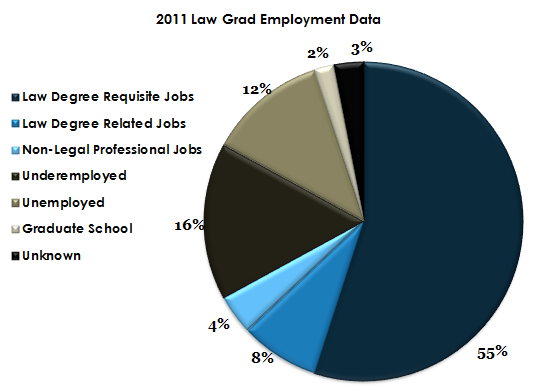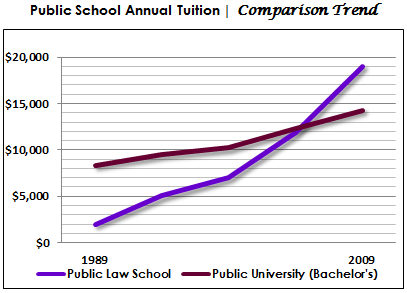| |
Specialized Paralegal Training or Law School?
By SHELLI CARTER |
With evolving demands in today’s job market, more bachelor’s degree holders are contemplating a return to school in search of a final stepping stone towards a stable, meaningful, and intellectually stimulating career. Given the varied degree paths (Post baccalaureate, Master’s, Juris Doctor, etc.) and wide-range in tuition and fees, careful consideration should be given in comparing costs vs. benefits and pragmatism vs. prestige when selecting the best program.
|
Attending law school is a dream of many interested in legal fields and a surge in law degree programs and class size has made that pursuit possible for more people than ever – so much that the influx of law degree grads over the past several years has far outpaced the availability of attorney positions, forcing schools to drastically cut enrollments1. In data compiled by the ABA, law school alumni from the class of 2011 indicated that only 55% of graduates were employed in jobs that required passing the bar exam, while 30% reported being unemployed, underemployed, or back in graduate school. A number of ABA accredited schools reported fewer than 40% of recent grads were employed as attorneys2. |
 |
Adding to the encumbrance of recent law school graduates is the trend of tuition fees skyrocketing alongside enrollments. Indeed, over the last 20 years law school tuition has grown at a rate 4.5 times faster than the already escalating fees at 4-year schools3. In 2010, law students graduating with debt owed an average of $98,500, with many owing well into the six-digits4. Law school is a worthwhile dream for anyone looking for a challenging and prosperous career. But with the recent surplus of highly educated, deeply indebted law school graduates competing for mid-level positions, it is also a dream worth postponing until the market stabilizes.

If you are considering a law degree, treat your education choice with the gravity it merits and research your options carefully:
-
Understand the real cost of a program, including student loan deferments and interest rates. Know that the comparatively high tuition of law and business degree programs are frequently used by schools to subsidize less prosperous programs, sometimes by as much as 30%5. Make sure the curriculum is worth the price.
-
Ask pointed questions about a program’s advertised employment data. Be sure a school is not padding surveyed employment numbers with non-responders, temporary positions, and jobs unrelated to the degree program6. Additionally, salary data can be skewed when high-earners report salaries at a greater rate than low-earners.
The faculty and staff of Center for Advanced Legal Studies have dedicated over 25 years to the sole purpose of preparing & training students for careers as paralegals and related legal positions.
- Tuition is economical and it is circulated directly back into the paralegal programs. The United States Office of Education reports a Federal Median Loan debt of $7,500.00 and a debt-to-earnings ratio of 2.84% for graduates of the Paralegal Certificate Program (2010-2011).
- Students graduating from the Certificate Program in 2010 – 2011 are employed at a rate of 87%. Employment data includes only positions in the legal field.
Curriculum at CALS is specifically formatted to provide a comprehensive foundation for careers in the legal field, as well as simulate work-place scenarios. An education from Center for Advanced Legal Studies can launch a paralegal career; it can also accomplish an important stride on a path to law school. Regardless of your ultimate career goal, Center for Advanced Legal Studies is committed to fostering skills and opening doors to a rewarding career in an expansive and evolving legal field.

-
Nasri, G. “Law Schools Feel the Heat From Unemployed Grads,” HuffPost College, Feb. 24, 2012.
-
Palazzo, J. “Law Grads Face Brutal Job Market,” Wall Street Journal, Jun. 25, 2012. Caplan, L. “An Existential Crisis for Law Schools,” New York Times, Jul. 14, 2012.
-
Department of Education, National Center for Education Statistics
-
Henderson, W. and Zahorsky, R. “The Law School Bubble: How Long Will It Last if Law Grads Can’t Pay Bills?,” ABA Journal, Jan. 1, 2012.
-
Segal, D. “Law School Economics: Ka-Ching!”, New York Times, Jul 16, 2011.
-
Segal, D. “Is Law School a Losing Game?,” New York Times, Jan 8, 2011.



 thical standards and rules of professional responsibility." But what activities can one really expect to do each day as a paralegal?
thical standards and rules of professional responsibility." But what activities can one really expect to do each day as a paralegal?













